Inside Kaleidoscope, the student-led council supporting and uniting Khoury College clubs
Author: Milton Posner
Date: 12.08.23

Student clubs are an indispensable part of the Northeastern experience. Eager learners coalesce around shared passions, create and collaborate with like-minded friends, and supplement their required coursework with projects and activities of their choosing. At Khoury College alone, the results of this inspiration range from Mars rovers and electric racecars to computing mentorship for new students.
Enter Kaleidoscope, a newly formed, student-led consortium that aims to build community among Khoury College’s clubs, streamline their access to resources, and grow them throughout Northeastern’s global network. And with two dozen clubs and counting under their banner, the group’s leaders feel they’re well on their way.
“Clubs can often be overlooked or taken for granted at such a large university,” says James Chang-Davidson, a fifth-year computer science student who founded Kaleidoscope and serves as its president. “Whereas I feel that clubs are a tremendous part of the university, and a pivotal part of students’ social and professional experiences.”
More than 500 such groups make up Northeastern’s student life tapestry. But according to a recent survey, Chang-Davidson says, fewer than five percent of those clubs self-identify with Khoury College, the lowest of Northeastern’s nine colleges. By better supporting these clubs — plus a handful that identify primarily with other colleges, thanks to Khoury College’s many combined majors — he hopes that Kaleidoscope can pave the way for more of them.
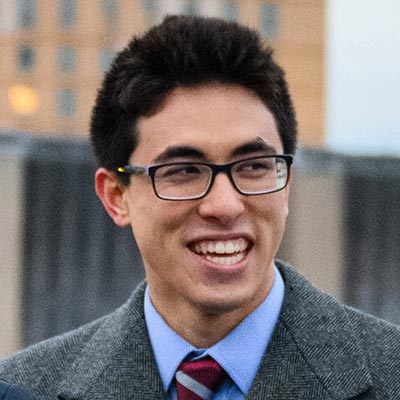
James Chang-Davidson
“We serve as the middleman between Khoury College and the clubs,” explains Ivy Jordan, Kaleidoscope’s community director and a second-year computer science and design student. “It’s hard for clubs to ask their college or Northeastern for help and resources; we’re a big school and there are lots of people to deal with for different things … We empower the clubs with the resources they need to grow.”
Kaleidoscope does this by advocating for increased and tailored club resources. This can mean money, but also project tools; for instance, the group is moving to supply student organizations with industry-standard computing resources as those organizations build software products for the Northeastern community.
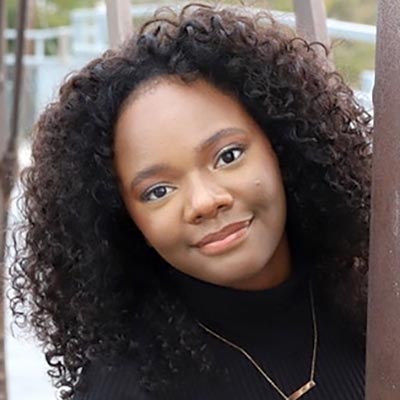
Ivy Jordan
Kaleidoscope is advised by teaching professor and assistant dean of student experience Mark Fontenot, ensuring close collaboration with the dean’s office. Fontenot helps Kaleidoscope in their efforts to centralize funding appeals and distribute money through its events fund and grants. By doing so, the group ensures all clubs have access to support and spares each club from needing to navigate complex funding processes alone.
“The fund aims to enhance club events and boost attendance by providing financial support for clubs to use [on] food, merchandise, or other means of making their events more engaging. The goal is to encourage a sense of Khoury community and shared experiences,” says Sara Takhim, a fourth-year cybersecurity student and Kaleidoscope’s co-head of operations. “Collaboration among clubs enables the sharing of diverse perspectives and ideas. This cross-pollination can help to develop unique, innovative projects and initiatives.”
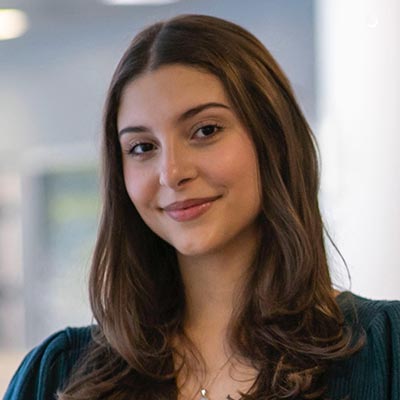
Sara Takhim
READ: From cybersecurity co-ops to women in tech, Sara Takhim makes her mark
And that’s not the only way Kaleidoscope aims to unite the college’s student organizations.
“It can be easy to compete with other clubs or compare yourself to them, and sometimes clubs do the same things under different names,” Jordan says. “Instead, we want these clubs to grow together. So we’re promoting workshops and events to help these clubs network and collaborate” on projects, events, and sponsorships for mutual benefit.
“It’s not that the clubs don’t get to be individual clubs,” adds Anika Sharma, Kaleidoscope’s global experience coordinator and a second-year computer science and environmental science student. “But we don’t want them to be off on their own with no sense of community. If they’re struggling, we can provide resources, network for them, and help them figure things out.”
The same goes for campuses outside of Boston. To date, only a small handful of clubs have sprouted at these newer, growing locations — a gap Kaleidoscope is working to bridge.
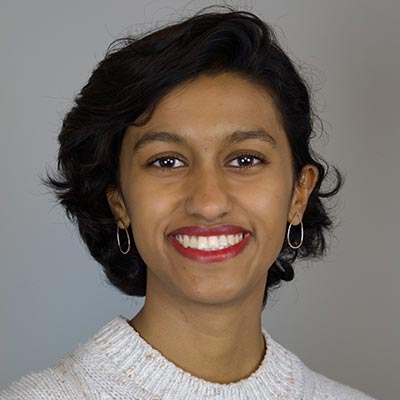
Anika Sharma
“It’s hard for students in some of these locations to start clubs, especially for students who know they’re going to transfer campuses,” Jordan notes, adding that Kaleidoscope can provide initial logistical support and aid the clubs’ continuity. “Once they’re established, we want to advocate for these clubs to help them grow and have longevity, to support them the same way we support Boston clubs. We don’t want clubs to die within the first two years because they’re on their own.”
In particular, Kaleidoscope is focusing on Northeastern’s Oakland and London campuses. In London, the group is trying to identify a group of students to support in creating either a new computing club or a chapter of an existing Boston club. In Oakland, where there is already a computing club, Kaleidoscope is looking to expand other Boston clubs out west, and to build a sustained and supportive connection with Oakland students as they build the organizations they want.
“We’re trying to help Boston clubs take the knowledge they’ve built up over the years and pass that on to other campuses,” says Sharma, who spent last year at Oakland as an NU Bound student before jumping to Boston this year, and who now focuses on Kaleidoscope’s inter-campus efforts. “I didn’t have the opportunity to join a club in Oakland, but in Boston I’ve joined quite a few, so extending that opportunity to other campuses is really exciting.”
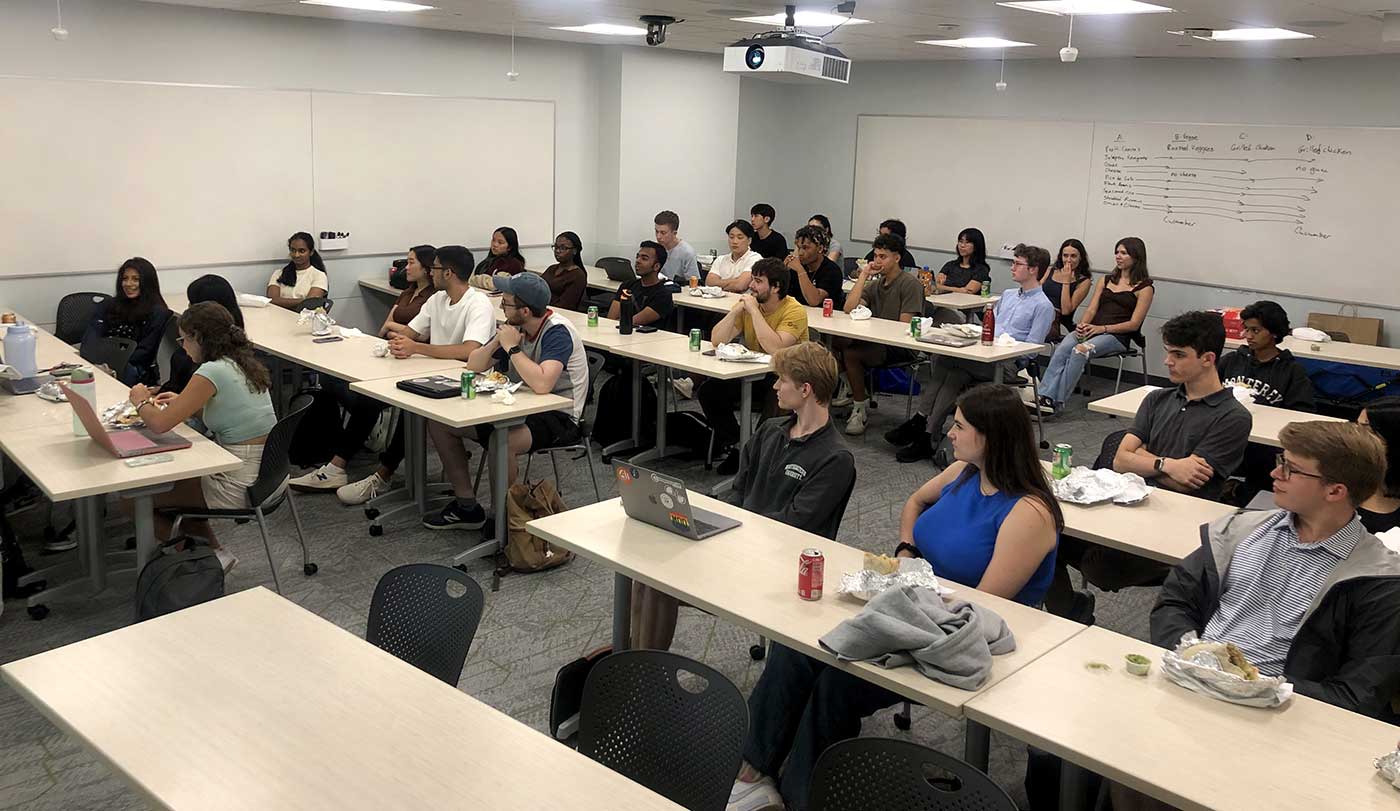
Kaleidoscope members at their first fall 2023 meeting.
In the short term, Kaleidoscope is providing funding for clubs’ educational computing programming, extending the university’s LinkedIn badging program to clubs, developing and assisting Khoury club leaders through its “How to Club” initiative, and collaborating with Makerspace at EXP on a maker fair.
“We want to have clubs present their work to employers … employers can then connect with clubs and invite students to work on projects,” Jordan says of the fair, noting the group’s discussions with co-op employers and its work with co-op coordinator Priyanka Bishnoi on career-related initiatives. “Given how fast-paced Northeastern is, students are always looking for their next project, their next leadership opportunity, their next co-op.”
In the longer term, Chang-Davidson wants to achieve the right balance between institutional support and student leadership, a balance he says was missing in previous attempts at Northeastern club councils.
“In founding Kaleidoscope, Khoury College takes the lead in student-led club councils … I really want to build a robust and lasting structure that would support unequivocal student leadership,” he says. “That means building a close relationship with Khoury College so the group is student-run, but funded and supported by Khoury College. We’re fortunate to have a dean’s office that is so supportive of what we do and that gives us the room to experiment and build Kaleidoscope.”
Subscribe to Khoury News
The Khoury Network: Be in the know
Subscribe now to our monthly newsletter for the latest stories and achievements of our students and faculty